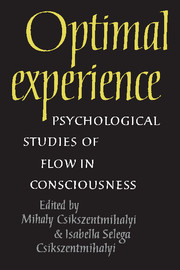Book contents
- Frontmatter
- Contents
- Acknowledgments
- Contributors
- I A THEORETICAL MODEL OF OPTIMAL EXPERIENCE
- II VARIETIES OF THE FLOW EXPERIENCE
- 5 Introduction to Part II
- 6 Bosozoku: flow in Japanese motorcycle gangs
- 7 Women, work, and flow
- 8 The relationship between life satisfaction and flow in elderly Korean immigrants
- 9 Flow and writing
- 10 Flow in solitary ordeals
- III FLOW AS A WAY OF LIFE
- IV THE MEASUREMENT OF FLOW IN EVERYDAY LIFE
- References
- Name index
- Subject index
9 - Flow and writing
Published online by Cambridge University Press: 05 June 2012
- Frontmatter
- Contents
- Acknowledgments
- Contributors
- I A THEORETICAL MODEL OF OPTIMAL EXPERIENCE
- II VARIETIES OF THE FLOW EXPERIENCE
- 5 Introduction to Part II
- 6 Bosozoku: flow in Japanese motorcycle gangs
- 7 Women, work, and flow
- 8 The relationship between life satisfaction and flow in elderly Korean immigrants
- 9 Flow and writing
- 10 Flow in solitary ordeals
- III FLOW AS A WAY OF LIFE
- IV THE MEASUREMENT OF FLOW IN EVERYDAY LIFE
- References
- Name index
- Subject index
Summary
Activities that produce flow experiences are autotelic and intrinsically motivated; that is, people do them simply because they are enjoyable, even if no rewards follow. Thus flow activities are “useful” in that they provide a state of being that is an end in itself. But it seems that flow is useful in another sense. The negentropic state of consciousness that comes into being when the person is in tune with the environment is the most efficient condition of the organism. A person in flow should be able to function at his or her best. A worker should be at the peak of his or her productivity when the work is enjoyable. This is presumably even more true when that work involves creativity, because the spontaneous investment of psychic energy necessary for an original accomplishment is most likely to occur when the person enjoys what he or she is doing (Amabile 1983).
The task of this chapter is to examine how the writing of an original composition is affected by conditions of psychic order and disorder. The process of writing an English theme was investigated because it represents a creative challenge that everybody who has gone through high school is familiar with. The question is, to what extent do negative emotions such as anxiety or boredom interfere with the completion of such a task? To what extent is the experience of flow in writing related to its successful completion?
- Type
- Chapter
- Information
- Optimal ExperiencePsychological Studies of Flow in Consciousness, pp. 150 - 171Publisher: Cambridge University PressPrint publication year: 1988
- 22
- Cited by



